Recently Brothers Phap Luu and Phap Linh and other representatives of the PIum Village community interviewed Bill McKibben about the current climate crisis.
Introducing Bill McKibben
Bill McKibben is a climate change activist, author and journalist. He wrote the book “The End of Nature” in 1989, which introduced much of the West to to the climate crisis. His book, “The Age of Missing Information”, which is an experiment he did, of watching 100 channels of cable TV for 24 hours each, as a way of looking into the mass media. He declared that the main message that comes through is that “I am the most important person”. That is what the TV is telling us 24 hours a day.
He founded 350.org in 2008 with many others, which continues to be a major force in organizing climate marches, divestment from carbon-emitting industries. Bill also continues to work in the areas of racial and social justice addressing the climate crisis.
On Finding Courage and Perseverance to Continue
Br Phap Linh: You put a lot of energy every day into helping the planet and building movements that can contribute to a collective awakening. How do you maintain your energy and well-being in the midst of such intense activism?
Bill McKibben: There have definitely been moments over the last three decades when I’ve been pretty depressed and despondent at what’s afoot because it’s incredibly scary. This is the largest thing that’s ever happened on our planet, at least in human time. And it’s happening (this is important) extremely fast. We have, unlike other problems that we face, a very limited amount of time in which to deal with it; and if we don’t, we won’t be able to. And so those are things that can let one get very sad sometimes, especially because the root unfairness of climate change is so deep and so real. If there is an iron law with global warming, it’s that those who did the least to cause it feel its effects first and hardest. And so, certainly out of my faith tradition– I’m a Methodist– and I think out of all faith and moral traditions, really, that adds to the emotional power of the moment we’re in.
That said, I’m able mostly to keep going and fighting because over the years, so many other people have joined in. Now with each passing year, because of the organizing that so many people have done, there is a huge movement of people that builds. When we started 350.org, about a decade ago, it was kind of the first iteration of a global grassroots climate movement and it helped things get going. But now there are so many other wonderful things that have joined in such as with Extinction Rebellion, or the incredible work that diplomats around the world managed to do to pull off the Paris Climate Accords in 2015, against all odds. Or the rise of young people, first in the United States, demanding a kind of Green New Deal, and figuring out some ways forward. And then, beautifully, the rise of junior high and high school age students around the world, you know. I’ve gotten to know Greta Thunberg. She’s a friend and I adore her. But the really good news is there are ten thousand Greta Thunbergs all over the planet, young people who do astonishing work.
So, now there’s a movement of people in place. And history indicates that it’s only when we build movements like that that we’re able to stand up to concentrations of wealth and power.
Bill McKibben
So, now there’s a movement of people in place. And history indicates that it’s only when we build movements like that that we’re able to stand up to concentrations of wealth and power. The other great gift of the 20th century is the development of nonviolent social movement. Great leaders like the suffragists, or Gandhi, or Dr. King, always operating at the margins of society, understood this new method of allowing change, allowing the many, the small and the many, to stand up to the mighty and the few in in a new and remarkable way.
A Change of Perspective
Phoebe Tickell: What are the myths that you feel really have the power to bring people into a place of inspiration and energy to really fight for what they love?
Bill McKibben: One of those, I think, is the notion that we’re not at the center of things necessarily, that we’re part of things. It’s quite possible to me that our job in this century is to figure out ways to make ourselves somewhat smaller. You know, human beings, their position vis- a-vis the rest of the world was always, we’re small on a large world whose forces can overwhelm us, you know? Figuring out how to make ourselves somewhat smaller in lots of ways seems very key. It seems to me a kind of key theological question too. For me, one of the most important documents so far this millennium was Pope Francis’s extremely eloquent encyclical on climate change, “Laudato Si”, in which he is talking about global warming, but really is a critique of modernity in many ways, including the fact that modernity proves so devastating for so many people on the margins. So whether one’s looking at a tree or one is looking at a slum or one is looking at the latest science. It’s that sense of perspective and figuring out how to take ourselves out of the center a little bit, seems crucial to me.
The Wisdom of Indigenous Communities
Filipe: How do you see the role of indigenous people?
Bill McKibben: Maybe the single most useful thing that’s happened in the environmental movement in the last decade is the degree to which indigenous communities around the world have kind of stepped into the forefront. What we call “frontline communities”. Communities of color in general, but indigenous communities are playing a particular role, for a few reasons. Some of them, just, almost by accident. On the North American continent, and to some degree elsewhere in the world, when colonizers arrived, they pushed indigenous people off into lands that they thought didn’t have any value. And it turns out now in the 21st century that that land is either on top of a lot of coal and gas and oil, or it’s astride the routes you’d need to send a pipeline or something through to get coal and gas off to someplace else. So the leadership role that people have been playing is immense.
Some of my favorite colleagues in this work that I talk to and work with regularly are in the South Pacific, on those islands that very well may not exist by the end of this century. But their slogan is “We’re not drowning, we’re fighting”. And they’re fighting in remarkable ways, nonviolently. I’ll never forget watching people from each of those islands build a traditional canoe, and then take them to Newcastle in Australia, which is the largest coal port in the world, and use those canoes to blockade in for a day the biggest ore ships in the world, to keep them from getting coal out to Asia. It was a truly powerful and important protest, and those sort of things go on day after day.
One of the things that makes this moment so useful, I think, is that the very oldest wisdom traditions on our planet, indigenous wisdom traditions, and the very newest wisdom traditions – our most advanced science – are beginning tell us largely the same things. That is, the view from the sweat lodge and the view from the supercomputer and the satellites, are agreeing on the fact that we cannot continue doing what we’re doing. Basically, what both those world views are saying is, the conventional wisdom that most of us hold, that we’re just going to keep living in ever-larger economies and whatever, is wrong-headed, and not where we want to be anyway. So I think that’s a moment of extraordinary power, that convergence of the very ancient and the very modern.
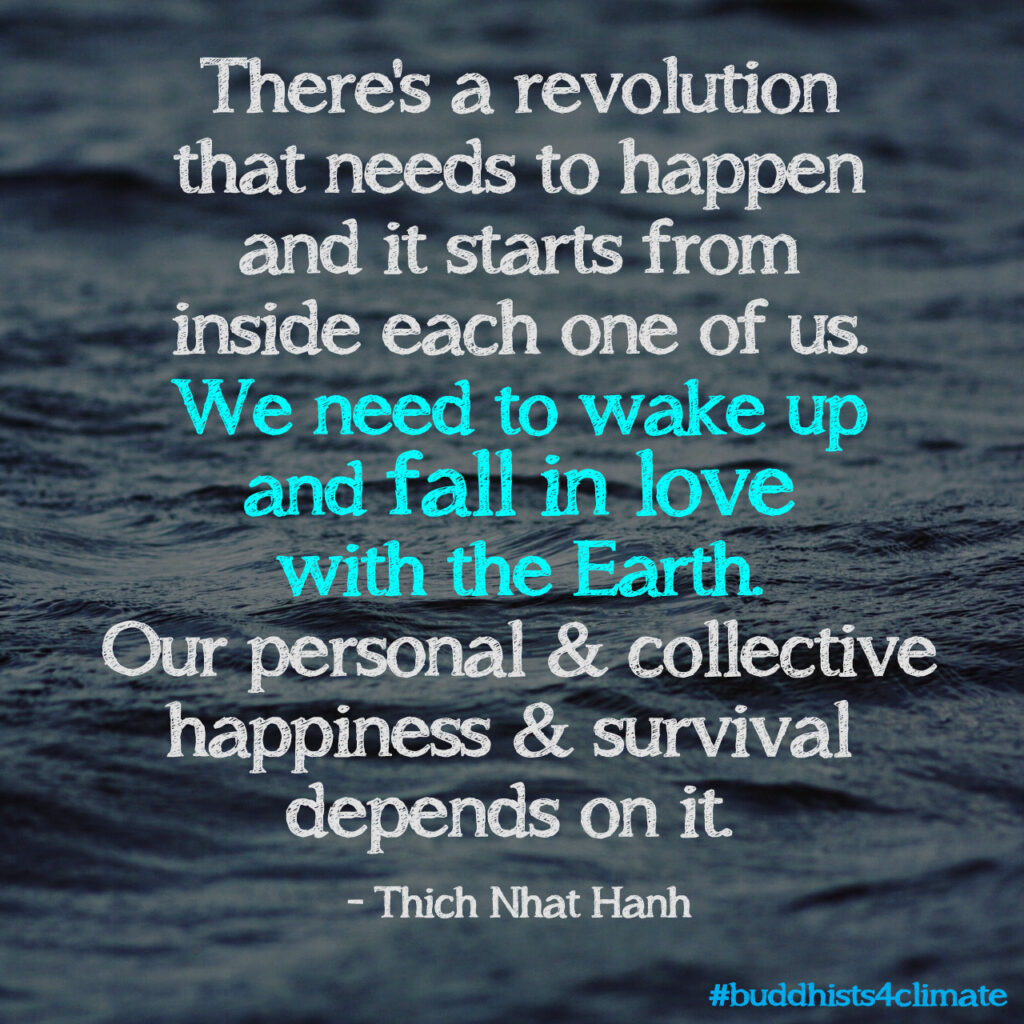
Fighting Climate Apathy and Inspiring Courageous Action
Br Phap Linh: What I notice, for people who don’t seem yet to be ready to take up the cause and act, it is maybe that they’re overwhelmed emotionally. Perhaps it’s just that the emotion is so great that they don’t have the resources to embrace it. It’s just terrifying. So the easiest thing is another episode of something on Netflix or just cover it up in any way possible. Do you have any success stories from your experience of being able to kind of aikido that apathy and turn it into engagement, enthusiasm, courage hope?
Bill McKibben: Two things. First one is, some of that’s unavoidable. So don’t despair at it. The good news is that, you know, making change doesn’t require that you get 51 percent of people engaged in something. And the reason that it doesn’t is because apathy cuts both ways, you know. I remember when we did the first great climate march, it took a year’s work to get 400,000 people on the streets in New York. And it was all the work of building coalitions and… acquiring porta potties and… all the other things that it takes to do that. The one thing we didn’t worry about was that the next day there’d be another 400,000 people in the streets demanding more climate change, you know. What the literature seems to tell us is if you can get four or five percent of people engaged in a fight, it’s usually enough to win. And so we should take some heart from that, because we’re getting nearer those kind of numbers.
Now, to the deeper question of how to get people engaged, I think your intuition is exactly correct. It’s not that most people don’t understand that this is a crisis. You’d have to be willfully obtuse at this point, because you can look out, every day on the TV and see a forest on fire or a city underwater or whatever it is.
A problem, I’ve always thought, is that climate change seems incredibly large and we seem in its face incredibly small. So what could we do that would have any impact? And that’s actually a correct intuition. There really is nothing, as individuals, that any of us are going to do at this late date to change the math here. And that’s why I think people, young people especially, sometimes rebel when they’re told that the answer is new light bulbs or whatever. Yes, they’re good. They’re important. You know, I’m very proud of all my solar panels on the roof but I don’t try to fool myself that that’s how we’re going to win this fight. You can’t make the math work, in the time that we have, one Tesla at a time or one vegan dinner at a time.
So that’s really one of the reasons that we build movements, is to allow people to see that there’s a plausible chance that they actually do have some agency to make a change, to change the fundamental rules of the game that could produce outsized shifts in the level of carbon in the atmosphere. And a way of saying this is, at this point in time, the most important and in some ways most heartening thing, an individual can do is, be a little bit less of an individual. Is come together with others in movements large enough to make a difference.
And as we do that kind of organizing, then people… I’ve seen a thousand times, people suddenly kind of take courage and say, “OK, that makes sense to me now. Here I am at Imperial College in the U.K. working for divestment. And I can do that because I know who the board of trustees is and how I can affect them. And I understand that simultaneously there are a million other people at institutions around the world making the same case, and that it will add up to something larger than the sum of its parts. And it presents some plausible pathway forward, that’s at a scale equivalent to the scale of the problem that we face.” So that’s why I’ve come to think that organizing is such a key thing, and such a key part of being human is… All an organizer is someone who’s able to talk with the people around them and get them working together in the same direction. And that’s desperately what we need right now. That’s the closest to a kind of elixir that I have found to allow people to get the kind of courage that’s required to stare, quite plainly, at the crisis that we’re in, and not blink, and not turn away, and if they’re shedding a tear, which they should be, nonetheless to be able to see through those tears to where we need to be, and how we’re going to get there.
Discover more
- More about Bill Mckibben
- The Earth Holder Sangha – a mindful earth justice initiative
- Rebel for Life – a film about Plum Village practitioners engaged in climate activism



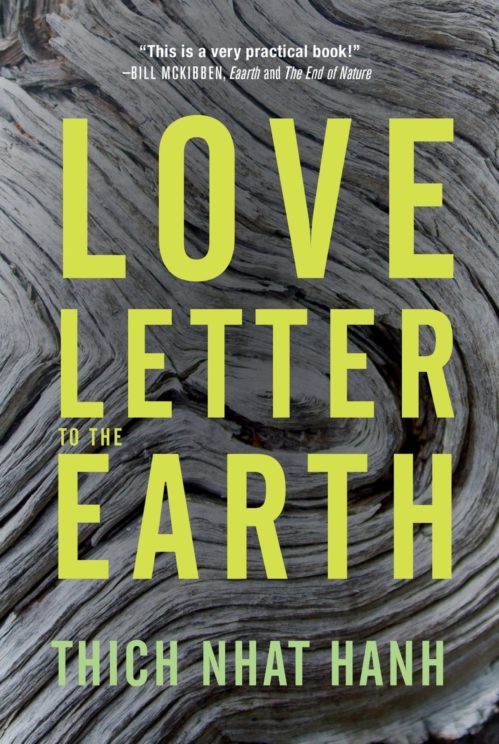
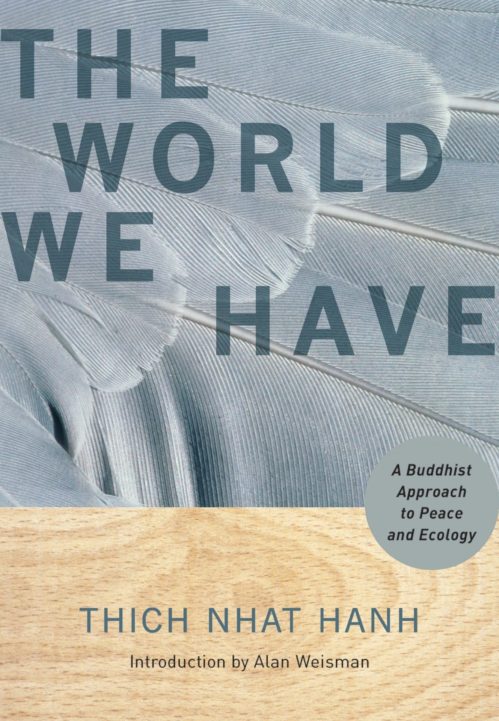
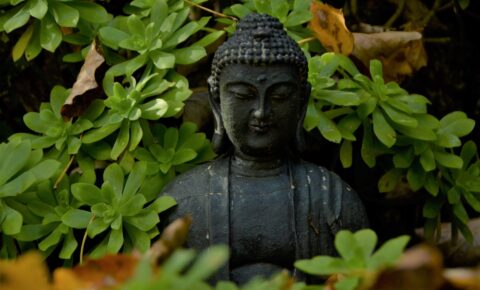
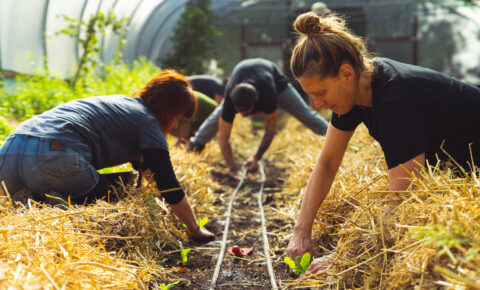
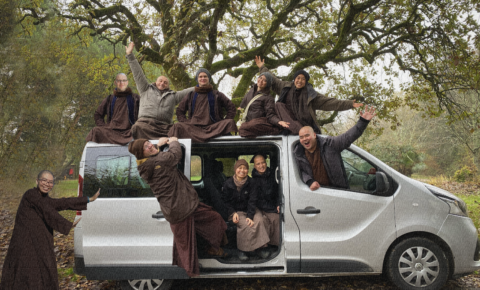
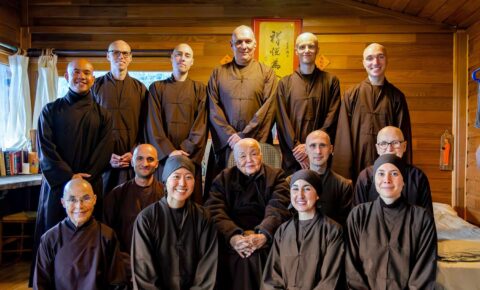
Join the conversation